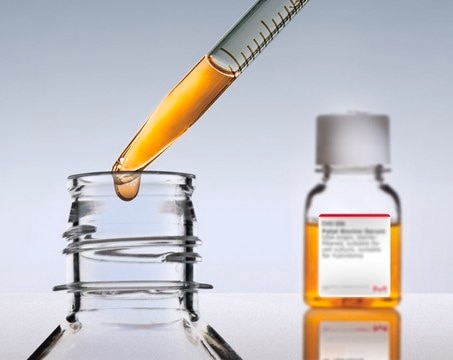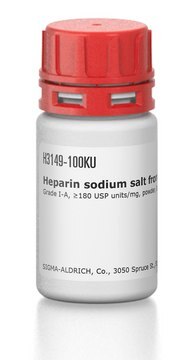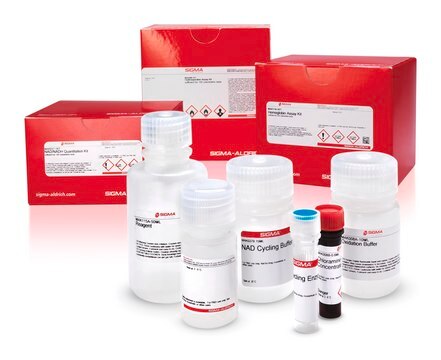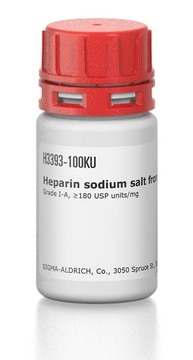219373
Cathepsin G, Human Neutrophil
Cathepsin G, Human Neutrophil, CAS 107200-92-0, is a purified native cathepsin G. Acts as a potent agonist of human platelet activation leading to their aggregation.
Synonym(s):
Cathepsin G, Human Neutrophil
Sign Into View Organizational & Contract Pricing
All Photos(1)
About This Item
CAS Number:
MDL number:
UNSPSC Code:
12352202
Recommended Products
Quality Level
Assay
≥95% (SDS-PAGE)
form
lyophilized solid (Salt-free)
specific activity
≥2 units/mg protein
manufacturer/tradename
Calbiochem®
storage condition
OK to freeze
shipped in
ambient
storage temp.
−20°C
General description
Native cathepsin G from human neutrophil. A serine protease that degrades collagen and proteoglycans. Has been implicated in connective tissue diseases such as emphysema and rheumatoid arthritis. Acts as a potent agonist of human platelet activation leading to their aggregation. Reported to be involved in the activation of pro MMP-2 via mechanism requiring MT1-MMP. Inhibited by chymostatin, DFP, and Z-Phe-CH2Br. Reconstitute in 150 mM NaCl, 50 mM sodium acetate buffer, pH 5.5.
Native cathepsin G from human neutrophil. A serine protease that degrades collagen and proteoglycans. Has been implicated in connective tissue diseases, such as emphysema and rheumatoid arthritis. Acts as a potent agonist of human platelet activation leading to their aggregation. Inhibited by chymostatins, DFP and Z-Phe-CH2Br.
Note: 1 mU = 1 milliunit.
Warning
Toxicity: Standard Handling (A)
Unit Definition
One unit is defined as the amount of enzyme that will hydrolyze 1.0 µmol of Suc-AAPF-pNA per min at 25°C, pH 7.5.
Preparation Note
Prepared from blood that has been shown by certified tests to be negative for HBsAg and for antibodies to HIV and HCV.
Reconstitution
Following reconstitution, aliquot and freeze (-70°C) for long term storage or refrigerate (4°C) for short term storage. Stock solutions are stable for up to 1 week at 4°C or for up to 6 months at -70°C.
Reconstitute in 50 mM NaOAc and 150 mM NaCl, pH 5.5.
Other Notes
Glusa, E., and Adam C. 2001. Por. J. Pharmacol.133, 422.
Shamamian, P., et al. 2001. J. Cell Physiol.189, 197.
Groutas, W.C., et al. 1993. Biochem. Biophys. Res. Commun.197, 730.
Stone, P.J., et al. 1993. Biochem. Biophys. Res. Commun.197, 130.
Groutas, W.C., et al. 1992. Arch. Biochem. Biophys.294, 144.
Maison, C.M., et al. 1991. J. Immunol.147, 921.
Travis, J. 1988. Am. J. Med.84, 37.
Shamamian, P., et al. 2001. J. Cell Physiol.189, 197.
Groutas, W.C., et al. 1993. Biochem. Biophys. Res. Commun.197, 730.
Stone, P.J., et al. 1993. Biochem. Biophys. Res. Commun.197, 130.
Groutas, W.C., et al. 1992. Arch. Biochem. Biophys.294, 144.
Maison, C.M., et al. 1991. J. Immunol.147, 921.
Travis, J. 1988. Am. J. Med.84, 37.
Legal Information
CALBIOCHEM is a registered trademark of Merck KGaA, Darmstadt, Germany
Storage Class Code
11 - Combustible Solids
WGK
WGK 3
Flash Point(F)
Not applicable
Flash Point(C)
Not applicable
Certificates of Analysis (COA)
Search for Certificates of Analysis (COA) by entering the products Lot/Batch Number. Lot and Batch Numbers can be found on a product’s label following the words ‘Lot’ or ‘Batch’.
Already Own This Product?
Find documentation for the products that you have recently purchased in the Document Library.
Our team of scientists has experience in all areas of research including Life Science, Material Science, Chemical Synthesis, Chromatography, Analytical and many others.
Contact Technical Service




